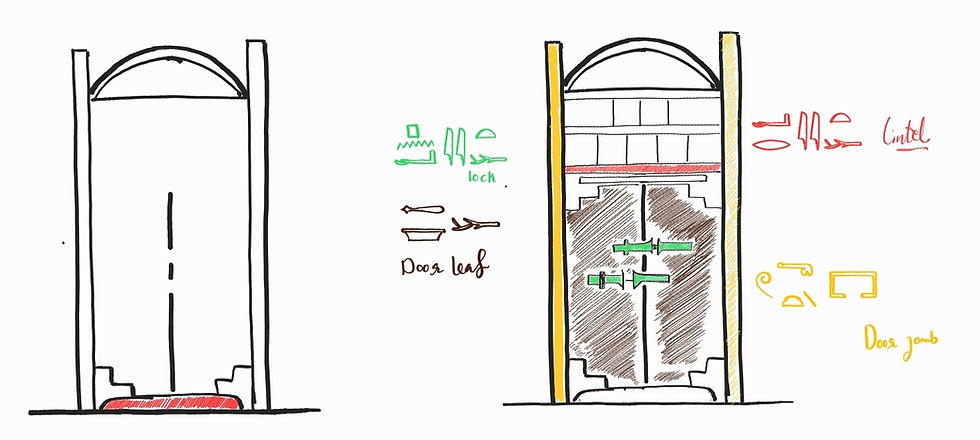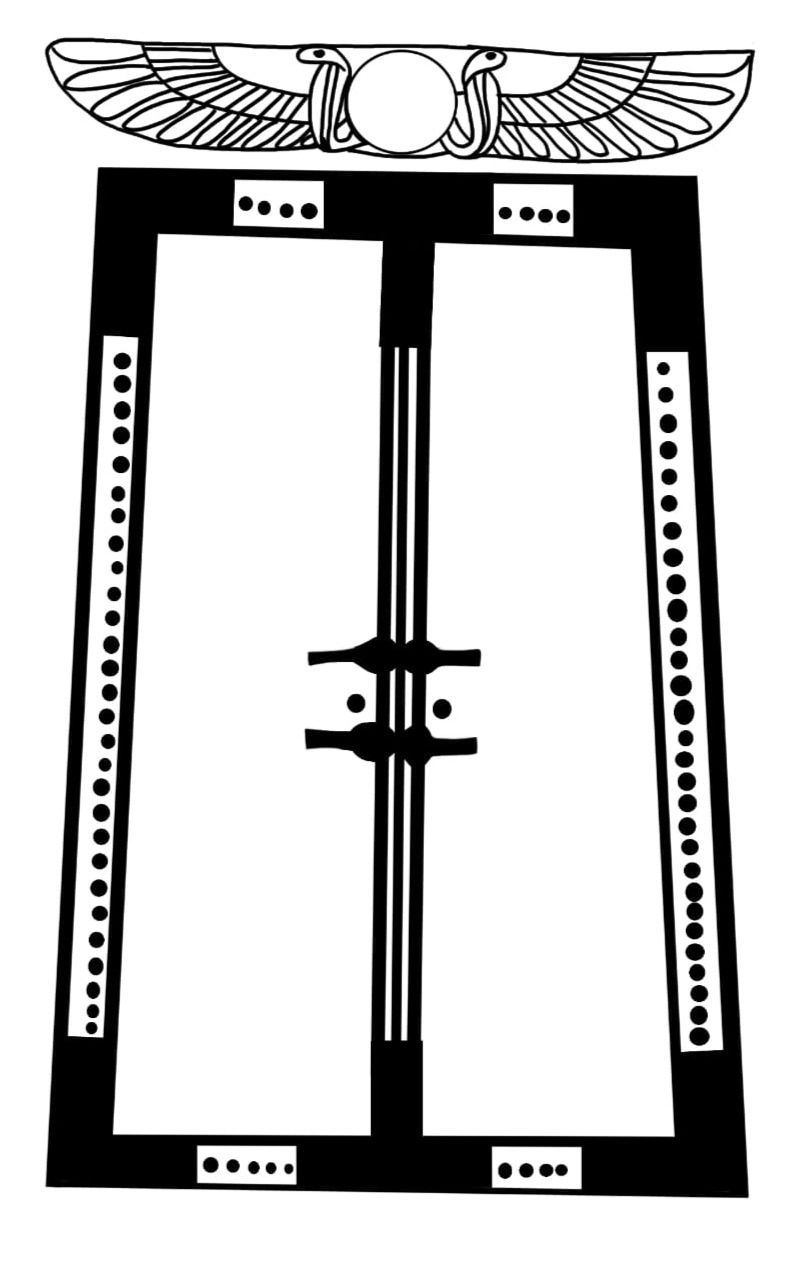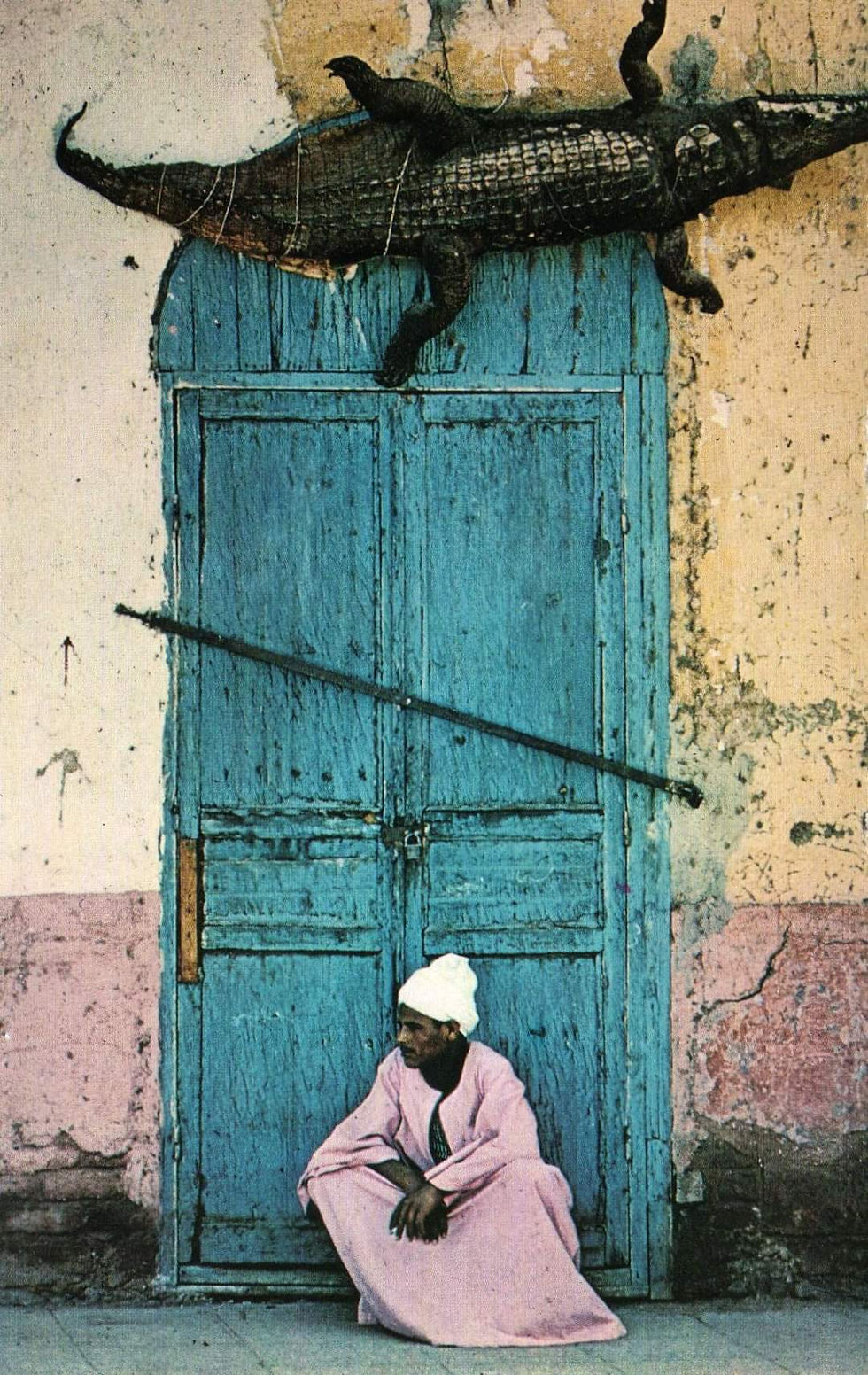
"I was supervising the construction of the village of Qurna in Luxor when I asked Alaeddin Mustafa the craftsman from the village of Mahamid in the Aswan to undertake the decoration of one of the entrances to the houses himself as he wanted, so he worked on the top of the door hieroglyphic shapes representing Nut - the gods of the sky from above and the shape of the earth or the mountain from below and between them A five-pointed star, and when I asked him how he came to these shapes, he did not answer more than that they draw the eye off the inside and keep the envious eye away from the door, but he did not know that they are Pharaonic symbols ' 1
Egyptian Doors :
Language - Material - Colours - Forms - Construction details - Dimensions - Revival
In the language / ϧⲉⲛ ϯⲁⲥⲡⲓ Egyptian Doors : ⲛⲓⲣⲁ ⲛ̀ϯⲙⲉⲧⲣⲉⲙⲛⲭⲏⲙⲓ

"the door was of copper, the bolts were of bronze, made for everlastingness, at which Eternity fears"
King Amenemhat I on his royal Palace
I made a door of seven cubits of cedar from Negau, for the first doorway of the tomb, and double doors of five cubits and two palms, for the shrine of the August chamber that is within this tomb.2

HWT-NBW Its doors were erected of coppers made from a single copper plate, its signs of electrum
1 Depicts Copper plate
Material
sycamore, Copper, bronze, cedar
Material was and still is a reflection of political, economic and social status, hence different materials were used with also number of dimensions following different norms according to the type of the construction. In this part we mention materials that was mentioned in texts or found in archeological sites, additionally trying to document them in The Egyptian Letter.

Copper
The scene showing metal workers is part of a wall depicting different professions in the tomb of Rekhmire', vizier of Tuthmosis III and Amenophis II. Above, the fires are kept ablaze with foot-operated bellows; below, the men are casting bronze doors in a large mould. The inscription states that the bronze is brought from Asia, from the land of Retjenu. Atlas of Egyptian art. Page 119

For Textual evidence on the matter of doors and portals, please see here Also sprach Senenmut: On Doors and Portals
Wood

Colours


''.I inspected the erection of the great doorway (named) : ‘‘Amon- Mighty-in-Wealth ;”4 its huge door was of Asiatic copper whereon was the Divine Shadow,» inlaid with gold''
Ineni on Karnak Portal 3
Doorjambs could be painted with horizontal stripes of various colors, while the ceiling could be a rich blue (House of vizier Nakht)

The door of the innermost Shrine, found in the Burial Chamber of the Tomb of TUTANKHAMUN. Egyptian Museum Cairo - photo Hans Ollermann 2016
I do not own any of these pictures, links for each picture will be added to in the references
For more information on Egyptian colours, please read Colours - Ⲛⲓⲁⲟⲩⲁⲛ
Forms

"Door architectural representations show various types of doors, from the simplest lintel set on the elaborate door with grilled arched transom (Neferhotep, Meryre) or the peculiar portal with broken lintel in Amarna. The usual type has vertical jambs and a deep lintel decorated with a torus molding and cavetto" A.B. III


Fig. . Reconstruction of front of serdab, mastaba of Seshem-nefer II, Giza.
Source of the picture : Old Kingdom statues in their architectural setting

Information and comments on this picture will be added as soon as possible

Construction Details
To be updated soon


Dimensions
On Account of what has been found in Lahun

For more information and a description of the drawing please read it on our Visual Library: Doors

I made a door of seven cubits of cedar from Negau, for the first doorway of the tomb, and double doors of five cubits and two palms, for the shrine of the august chamber that is within this tomb. A.B.-2 p124
Notes on Egyptian doors
One of the remarkable things is the proportions of the dimensions of the doors, which are strangely unrealistic ... possible due to the small available drawing space, with details that have priority over the architectural aspect in some cases.It is possible to explain the illogical size that the painter did not intend to illustrate the dimensions of the place geometrically, as much as his purpose was to illustrate a sequence and specific activities. Like when you tell a story, you say the house had four rooms, but you will not necessarily explain the dimensions of each room in exact numbers.
Dr. Badawy goes to the hypothesis that the door was relatively small. ''The proportions could seem to us not to conform to reality If we judge according to the models of classical or contemporary architecture; however, we must not lose sight of the fact that the Egyptian doors must have been much smaller than ours. The funeral homes of Hermcupolis West (3) provide us with well-preserved examples. Perhaps the primary reason for this small size should be sought in the difficulty of finding an adequate lintel for wider openings (3), or simply in the search for privacy.'' A:B
Whatever the case, these drawings most likely were not used by the workers as a reference during the construction process. Sketches and even drawings of the axes of buildings have reached our hands after all the theft and vandalism throughout ancient and modern history, to clearly show us that the Egyptians knew the strict engineering drawing in its engineering sense which students study today in universities
Revival


استرجاع المعمار الضايع بالاستدلال عليه مما تبقى من معمار مصري محفوظ/منهوب في المتاحف او المعمار الموروث في اللاوعي الجمعي زي تمساح الجنوب.
ancient Egyptian symbolism remains woven into the fabric of everyday life in modern Egypt.
While their original meanings may fade over time, the motifs continue to serve protective and aesthetic functions.
Alaeddin Mustafa’s work illustrates the subconscious transmission of cultural heritage—a bridge between the ancient and the contemporary.
يمكن الابقاء على ماتم حفظه واسترجاع الاثر المدمر او حتى الابداع فيه. الابداع كان منهج غير غريب على المعماري المصري الي كان بيتفاخر بمنجزاته التي لم يسبقها اليه معمارين مصريين قبله
even though I am still searching for doors that have lines from ancient Egypt and have not yet found an explicit shape except for one door or two that borrows Egyptian shapes and places them on the door, neither the Egyptian shape nor its location has to do with the Egyptian proportions and design philosophy.
As in many cases, it is not more than an empty metaphor with nothing to do with the core of Egyptian design.
For more on the trend of Egyptian design for business, please read the Egypt Visual Identity.
1 " كنت أشرف على بناء قرية القرنة بالأقصر حين طلبت إلى المعلم علاء الدين مصطفى البناء من قرية المحاميد بمركز أسوان أن يتولى زخرفة أحد مداخل المنازل بنفسه كما يريد، فعمل بأعلى الباب أشكالا هيروغليفية تمثل نوت - آلهة السماء من أعلى وشكل الأرض أو الجبل من أسفل وبينهما نجمه ذات خمسة أطراف، وعندما سألته كيف توصل إلى هذه الأشكال لم يجب بأكثر من كونها تلفت نظر الداخل وتبعد عين الحسود عن الباب، ولكنه لم يكن يعرف أنها رموز فرعونية ' ١٩٦٤ العمارة النوبية-بحث مقدم من المهندس حسن فتحي سكرتير عام مجلس بحوث الاسكان بوزارة البحث العلمي
1 Nubian architecture - a research submitted by Engineer Hassan Fathi, Secretary General of the Housing Research Council at the Ministry Research 1964
History of Egyptian Architecture A.B.-2 , Door(way) 10,14, 17, 19,21, 22, 27,29, 31, 33, 41, 46, 56, 59, 67, 70,73,83,124,128,130,131,134,136,138,140,158,s293,216
History of Egyptian Architecture A.B.-3, Door 155. 354.; - frame inscribed 127 jambs painted. 94; inscribed 126;-sill, 115; sliding, 264. 265; stone, 142
Koenigsberger, Die Konstruktion der Ӓgyptischen Tur.
Brunner, “Die Rolle von Tür und Tor im Alten Ägypten”.
Koenigsberger, Die Konstruktion der Ӓgyptischen Tur, 16–17;
Clarke and Engelbach, Ancient Egyptian Construction and Architecture, 162
Drawings from ancient Egypt byPeck, William H., 1932-
30 Drawings from ancient Egypt byPeck, William H., 1932- P131
77 The Tomb of Tetaky at Thebes (No. 15) Author(s): N. de Garis Davies

P347

2 A.B.-2 p124
4 AB-3 P94




interesting drawings, I wish if there was more on the wood used and other matierals for the doors in different types